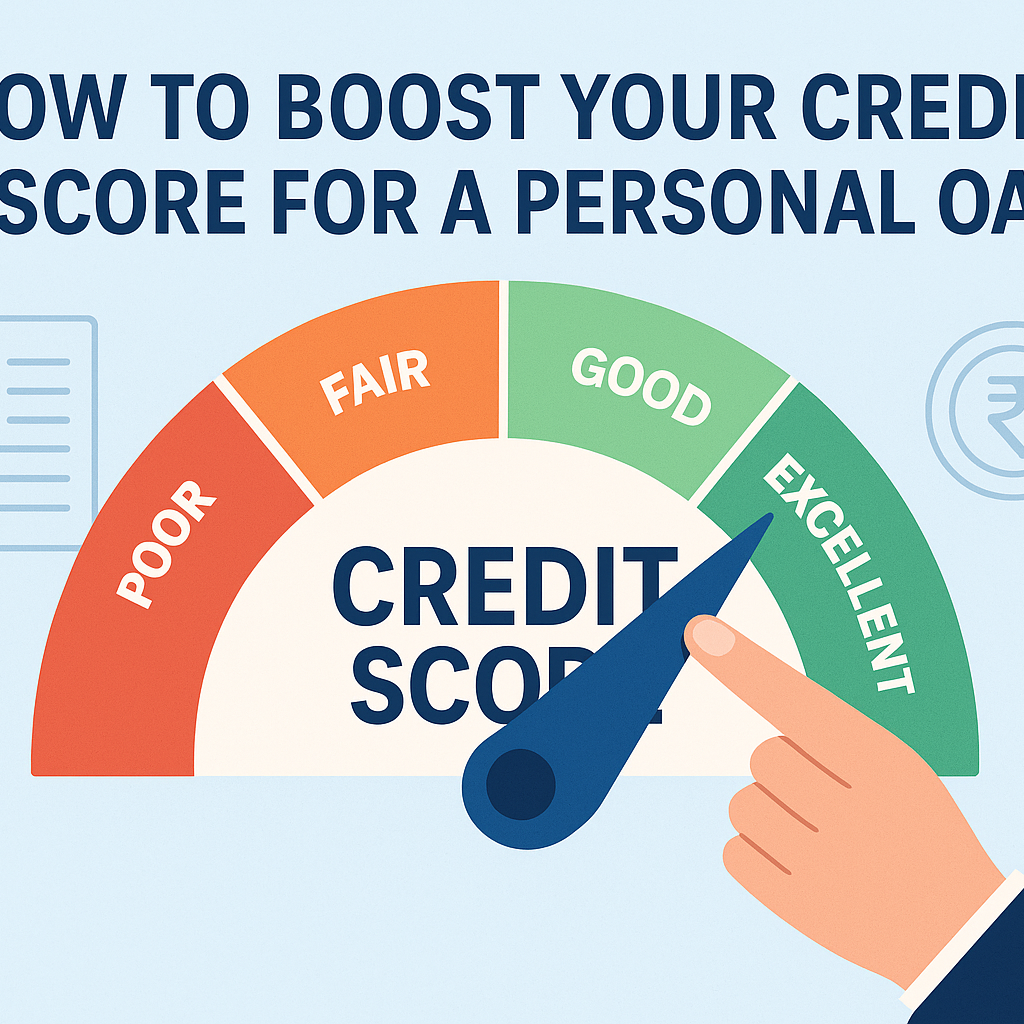A personal loan can be a financial lifesaver, whether you’re consolidating debt, covering emergency expenses, or planning a major purchase. But before lenders approve your application, one of the first things they check is your credit score. A higher credit score not only increases your chances of getting approved but also helps you secure better interest rates and loan terms.
So, how can you improve your credit score and increase your chances of getting a personal loan? Let’s break it down.
Contents
Your credit score is a numerical representation of your creditworthiness. It typically ranges from 300 to 900 in India, and scores above 750 are generally considered good.
Lenders use this score to evaluate:
Your repayment habits
Existing debt
Credit utilisation
Length of credit history
A strong credit score gives lenders confidence that you’re likely to repay the loan on time.

Start by reviewing your credit report from bureaus like CIBIL, Experian, or Equifax. Look out for:
Errors in personal details
Incorrect loan or credit card balances
Unrecognised accounts or missed payments
Why it matters: Even small errors can lower your score. Dispute and correct inaccuracies immediately.
Late or missed payments are one of the most damaging factors to your credit score.
Tips:
Set auto-pay for credit card bills and EMIs
Set reminders a few days before the due date
Consistent timely payments show lenders that you’re responsible and dependable.
Credit utilization refers to how much of your available credit limit you’re using. Keeping it below 30% is ideal.
For example: If your credit card limit is ₹1,00,000, try not to spend more than ₹30,000 in a billing cycle.
Why it helps: Lower utilization signals that you’re not dependent on credit and can manage your finances well.
Every time you apply for a loan or credit card, lenders perform a hard inquiry on your report, which can reduce your score slightly.
Tip: Compare personal loan options online or through pre-approved offers before applying. This avoids multiple hard checks.
A combination of secured (like home or car loans) and unsecured credit (like personal loans or credit cards) improves your credit profile.
Why it matters: It shows your ability to handle different types of credit responsibly.
Length of credit history impacts your score. Even if you’re not using a credit card, keep it active occasionally.
Tip: Use it once in a while for small purchases and repay in full.
Closing old accounts shortens your credit history and could affect your score.
Requesting a credit limit increase can reduce your credit utilization ratio, especially if your spending stays the same.
Caution: This only works if you don’t increase your spending just because your limit is higher.
If a trusted family member has a good credit history, ask if you can become an authorized user on their credit card.
Their good payment history can reflect positively on your credit report.
Use the avalanche method (start with highest interest debts) or the snowball method (start with the smallest balances) to clear dues.
Why: Reducing your debt burden helps increase your credit score and improves your eligibility for a personal loan.
Some fintech services or secured credit cards are designed to help people with low or no credit build their credit history.
Example: Some banks offer credit-builder loans where the borrowed amount is held in a savings account and released only after you repay in full.
While achieving a 700 credit score in just 30 days is highly unlikely, you can make significant improvements by focusing on key areas like making on-time payments, reducing credit utilization, and addressing any inaccuracies on your credit report
To achieve a CIBIL score of 800, focus on building a positive credit history by consistently making timely payments, maintaining a low credit utilization ratio, and diversifying your credit mix. Regularly check your credit report for any errors and address them promptly.
Applying for a personal loan can temporarily lower your credit scores by a few points. But the overall effect of the loan on your credit scores largely depends on how you manage the loan. If you make consistent, on-time payments, for example, getting a personal loan could help you improve your credit scores over time.
When you’re ready to take the next step in your financial journey, Networth Advisory is here to simplify the personal loan process for you. With expert guidance, a hassle-free application process, and access to multiple lending partners, we help you find the right loan tailored to your needs. Whether you have a strong credit profile or are working to improve it, our team ensures transparent support from start to finish.
Apply with Networth Advisory today—because your financial goals deserve the right partner.